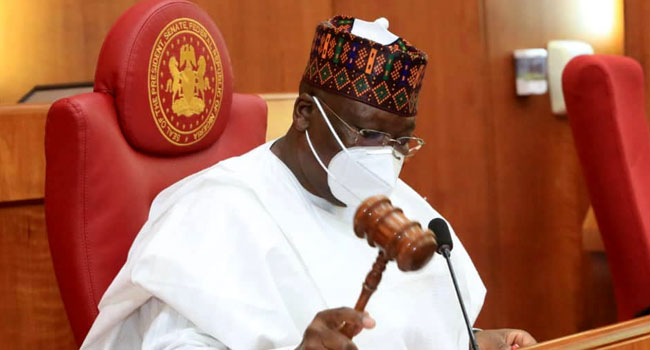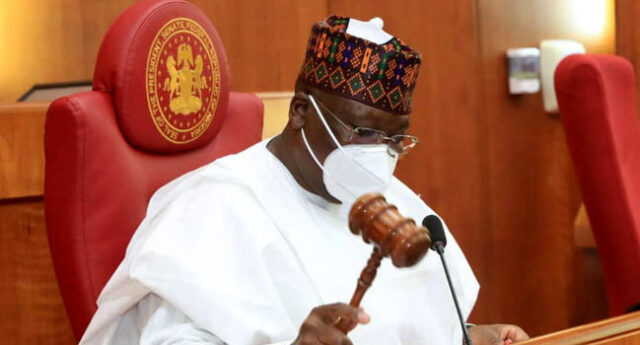
Nigerian politics and politicians, are indeed, a bunch of fun to follow. Very often, they command our attention, not for any patriotic or altruistic reasons. Unselfish or selfless service is not their forte. They are poor candidates to stand for change and democratic ideals. Neither do they have open mind, no conviction or scruples. They seek only the aggrandizement of their own, and that of their families. There’s no limit to how low the present members of the 9th National Assembly can go. As a matter of fact, they don’t mind being caught dead in a strip club if that is what it takes to satisfy their personal, cynical political ambitions . It’s all about the protection of the status quo, the existing state of affairs. It stinks. Nothing else matters. That’s why our politics heaves with hysteria. It’s about the fear of defeat, the panic of the unknown.
Although most Nigerian lawmakers hardly stand for anything ennobling apart from their own selfish interests, few things rankle and offend as last week’s passage of the much-anticipated Electoral Amendment Bill by both Houses of the National Assembly – the Senate – and House of Representatives. Perhaps most offensive clause in the amendment Bill is the insertion of Section 52(2) which disapproves the electronic transmission of election results. Prior to the passage of the amended bill, reports were rife that there was a grand plan to surreptitiously remove electronic transmission of results in the original draft of the Electoral Act( Amendment) Bill 2021. Both houses stoutly denied any such attempt. As sincere deceivers who never keep to their words, even in the face of reality, the APC- controlled parliament has finally achieved their sinister, ulterior motives.
This calls for serious concern. Last Thursday and Friday should go down in infamy as the moment that democracy was decapitated in Nigeria, if it is allowed to stand or sign into law by President Muhammadu Buhari. No more guarantee that elections in Nigeria will be credible, fair and transparent. According to the contentious provision , “voting at an election under this Bill shall be in accordance with the procedures determined by the Independent Electoral Commission, which may include electronic voting provided that the Commission shall not transmit results of the elections by electronic means”. Could this be alleged plans to rig the next elections in 2023? As THISDAY newspaper stated last Friday, the action of the Senate and the House of Representatives was driven by fear of defeat in the next elections. Many believe that deep-seated fear is real, but foreboding for Nigeria’s democracy.
The reasons given by the NASS for its action is laughable, asinine, reprehensible , antithetical to the ideals of democracy, and unconstitional. No law that contradicts the Constitution should stand. The lawmakers want to be a referee in a game which they are players. What a shame! What a scam! Wisdom requires that you cannot be a judge in your own court. Clearly, manual transmission of election results belongs to the medieval times, completely outdated. A year ago, the INEC Chairman Prof. Manhood Yakubu, had decried it. He said it was cumbersome and too expensive.
Just a few days ago , the electoral umpire reassured its preparedness to transmit elections results electronically. It did that successfully in Edo and Ondo gubernatorial elections. Mr. Festus Okoye, the National Commissioner for Voter Education and Information, said INEC was irrevocably committed to uploading election results nationwide, electronically. He said it will help deepen our democracy and make our elections credible and transparent, adding that INEC “has the capacity” to do that across the country, from every polling unit, to the Registration Area collation centres, to the local Government Collation centres, states and national collation centres.
And you begin to ask : what more assurance than this can you get from the umpire itself? But it is clear that interest of Nigerians and a credible election don’t matter to the National Assembly members who voted against electronic transmission of results. More laughable was the claim that most part of the country lack internet connectivity. And the Nigerian Communication Commission(NCC) was used to drive the big lie, to the effect that 3G coverage in the country is only 50 percen. Remember that the same NCC had on March 9, 2018, at the joint Technical Committee constituted by INEC, stated categorically that 3G in the country was almost 80 percent. Just recently, Mtn Nigeria one of the network providers ,said that 3G coverage in the country has reached 88.9 percent?
All that the NASS has done in the Electoral Amendment Bill, is inconsistent with the Constitution. And until the constitution is amended, all the insertions, are a nulity. To subject INEC to the dictates of NCC and the NASS, amounts to a coup d’etat. The Bill that was passed says NCC will determine whether INEC could transmit results electronically. This is contrary to the Electoral Act 2010, Clause 52(2) and Section 78 of the 1999 Constitution( as amended). Section 78 specifically states that “the registration of voters and the conduct of the elections shall be subject to the direction and supervision of INEC”. Also, in the Third schedule, Part 1, F, section 15, INEC has inherent powers to organise undertake and supervise all elections. The Constitution further provides that INEC operations shall not be subject to to the direction of any other authority. The role of the NASS stops at strengthening the legal framework of the commission, and not to put hurdles in the operations of the electoral umpire. It must not contradict the constitution which is the grundnorm to get things work in a democracy.
What all of this means is that the NASS is after their own personal agenda, not the collective interests of the country and the citizens. Imagine how, the Chairman of the Committeee that amended the Electoral Act, Senator Kabiru Gaya, voted against the very document he, and other members, recommended. These are not people to be trusted. They are what Jean Kipman-Blumen calls “The Allure of Toxic Leaders”(Oxford University Press, 2004). She explains why we follow destructive and corrupt politicians -and how we can survive them. Her analysis fits in what Nigeria is going through in the hands of politicians. To paraphrase the author, ‘bad leaders are like 17-year locusts. When they show up en masse, the public greets them with fascination and revulsion’. Look around, our politicians provoke a sort of frothing at the mouth.
Why they do what to do, is personal, selfish, inhumane. Nothing lofty and ennobling. In the fullness of time, history will judge them harshly, not kindly. Why our legislators, indeed, politicians are doing what they are doing without minding the consequences, is a sad lesson in power.You know why? As historian Robert A. Caro wrote, “no one can lead who does not first acquire power, and no leader can be great who does not know how to use power’. But the combination of the two skills is rare.
Our politicians know how to acquire power, by any means, but they lack the talent to know that power is transient, and there must be life about politics. The trouble of how we got to this messy situation in the country is that, what leaders do while they are trying to get power is not necessarily what they do after they have it. What they have done with the manipulation of the Electoral Bill tells it all. It’s not you that matters. It’s using raw power to accomplish their cynical agenda.
Source: Sahara Reporters







